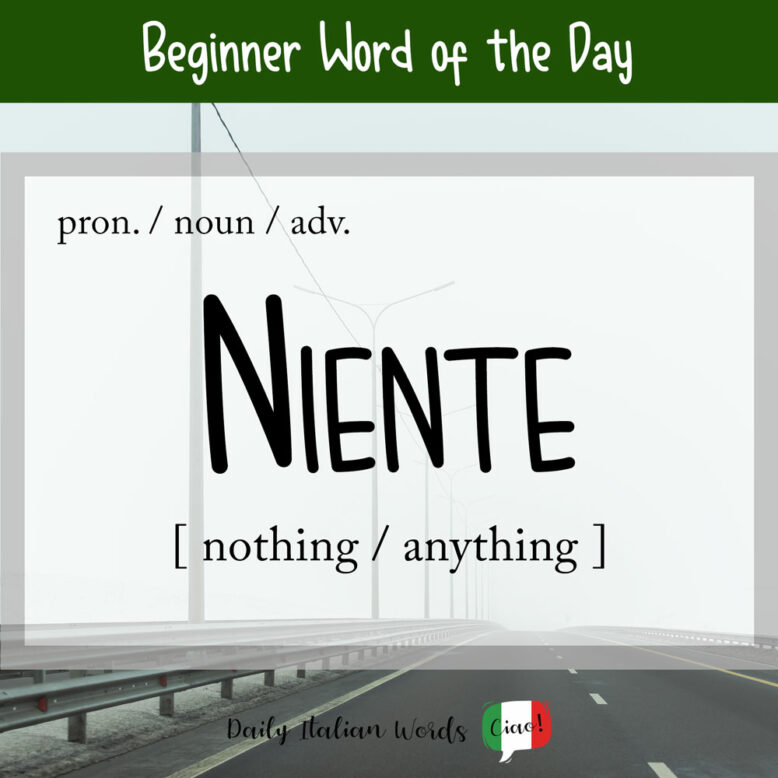English speakers are taught from an early age that putting more than one negative in a sentence is grammatically incorrect. In fact, I’m sure my English teacher would have spontaneously combusted had I ever written “I don’t have nothing,” in one of my essays!
Not so in Italian! In the language of love, it is perfectly acceptable to use two or even three negatives in one sentence, as we’ll discover by analysing our word of the day: niente.

Niente, which is the word for nothing (and sometimes anything) in Italian, frequently appears with the negative adverb non to form a double negative.
Che noia – non ho niente da fare!
What a drag – I’ve got nothing to do!
What a drag – I haven’t got anything to do!
Niente with the verb fare (to do) can be used to say that something doesn’t matter.
Mi sono dimenticato di comprare il latte. – Non fa niente, ne rimane ancora un po’.
I forgot to buy milk. It doesn’t matter, there’s a bit left.
It can also appear with non and other negative adverbs such as mai (ever/never), più (any more/no longer) or ancora (not yet/still) to form a triple negative. Whenever there are three negatives in a sentence, it is always translated as anything in English.
Non hai mangiato ancora niente. Stai male?
You haven’t eaten anything yet. Are you unwell?
Perché non hai mai niente da dire?
Why don’t you ever have anything to say?
Why do you never have anything to say?
Non riesco più a fare niente.
I can’t do anything anymore.
Niente can also exist on its own without any other negatives, as in the examples below.
Niente è come sembra.
Nothing is as it seems.
Ti serve niente dalla cucina?
You don’t need anything from the kitchen?
Si è comportato come se niente fosse.
He acted as if nothing had happened.
When preceded by the preposition per, you get the phrase per niente which means not at all. It can also be translated as an absolute no.
Non mi ha dato fastidio per niente.
It didn’t bother me at all.
Non ho per niente voglia di farlo.
I have no desire whatsoever to do it.
The noun niente is the word Italians use to describe nothingness, non-existence or the void.

Useful expressions featuring “niente”
- niente di niente = absolutely nothing
- niente a che vedere = nothing to do with
- manco per niente = not at all
- niente male = not bad
- niente di tutto ciò = nothing of the sort
- far finta di niente = act as if nothing has happened
- non c’entra niente = it has nothing to do with it
Idioms featuring “niente”
Non avere niente da invidiare a (qualcosa / qualcuno)
Literal: to not have anything to envy
Meaning: to be as good as (something / someone)
Niente nuove, buone nuove
Literal: no news, good news
Meaning: no news is good news
Non mi dice niente
Literal: it doesn’t say anything to me
Meaning: it doesn’t ring a bell
Tutto fumo, niente arrosto
Literal: all smoke, no roast
Meaning: all talk, no action

Heather Broster is a graduate with honours in linguistics from the University of Western Ontario. She is an aspiring polyglot, proficient in English and Italian, as well as Japanese, Welsh, and French to varying degrees of fluency. Originally from Toronto, Heather has resided in various countries, notably Italy for a period of six years. Her primary focus lies in the fields of language acquisition, education, and bilingual instruction.


